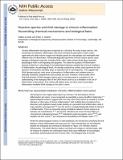| dc.contributor.author | Lonkar, Pallavi | |
| dc.contributor.author | Dedon, Peter C. | |
| dc.date.accessioned | 2012-11-16T16:33:12Z | |
| dc.date.available | 2012-11-16T16:33:12Z | |
| dc.date.issued | 2010-12 | |
| dc.date.submitted | 2010-09 | |
| dc.identifier.issn | 0020-7136 | |
| dc.identifier.issn | 1097-0215 | |
| dc.identifier.uri | http://hdl.handle.net/1721.1/74660 | |
| dc.description.abstract | Chronic inflammation has long been recognized as a risk factor for many human cancers. One mechanistic link between inflammation and cancer involves the generation of nitric oxide, superoxide and other reactive oxygen and nitrogen species by macrophages and neutrophils that infiltrate sites of inflammation. Although pathologically high levels of these reactive species cause damage to biological molecules, including DNA, nitric oxide at lower levels plays important physiological roles in cell signaling and apoptosis. This raises the question of inflammation-induced imbalances in physiological and pathological pathways mediated by chemical mediators of inflammation. At pathological levels, the damage sustained by nucleic acids represents the full spectrum of chemistries and likely plays an important role in carcinogenesis. This suggests that DNA damage products could serve as biomarkers of inflammation and oxidative stress in clinically accessible compartments such as blood and urine. However, recent studies of the biotransformation of DNA damage products before excretion point to a weakness in our understanding of the biological fates of the DNA lesions and thus to a limitation in the use of DNA lesions as biomarkers. This review will address these and other issues surrounding inflammation-mediated DNA damage on the road to cancer. | en_US |
| dc.description.sponsorship | National Institute of Environmental Health Sciences (CA116318) | en_US |
| dc.description.sponsorship | National Institute of Environmental Health Sciences (CA103146) | en_US |
| dc.description.sponsorship | National Institute of Environmental Health Sciences (CA026731) | en_US |
| dc.description.sponsorship | National Institute of Environmental Health Sciences (ES016450) | en_US |
| dc.description.sponsorship | National Institute of Environmental Health Sciences (ES002109) | en_US |
| dc.description.sponsorship | National Institute of Environmental Health Sciences (ES017010) | en_US |
| dc.description.sponsorship | National Cancer Institute (U.S.) | en_US |
| dc.description.sponsorship | National Science Foundation (U.S.) (grant no. CHE-1019990) | en_US |
| dc.description.sponsorship | Singapore-MIT Alliance for Research and Technology | en_US |
| dc.description.sponsorship | Massachusetts Institute of Technology (Westaway Fund) | en_US |
| dc.language.iso | en_US | |
| dc.publisher | Wiley-Blackwell Pubishers | en_US |
| dc.relation.isversionof | http://dx.doi.org/10.1002/ijc.25815 | en_US |
| dc.rights | Creative Commons Attribution-Noncommercial-Share Alike 3.0 | en_US |
| dc.rights.uri | http://creativecommons.org/licenses/by-nc-sa/3.0/ | en_US |
| dc.source | PMC | en_US |
| dc.title | Reactive species and DNA damage in chronic inflammation: Reconciling chemical mechanisms and biological fates | en_US |
| dc.type | Article | en_US |
| dc.identifier.citation | Lonkar, Pallavi, and Peter C. Dedon. “Reactive Species and DNA Damage in Chronic Inflammation: Reconciling Chemical Mechanisms and Biological Fates.” International Journal of Cancer 128.9 (2011): 1999–2009. Web. | en_US |
| dc.contributor.department | Massachusetts Institute of Technology. Department of Biological Engineering | en_US |
| dc.contributor.mitauthor | Dedon, Peter C. | |
| dc.contributor.mitauthor | Lonkar, Pallavi | |
| dc.relation.journal | International Journal of Cancer | en_US |
| dc.eprint.version | Author's final manuscript | en_US |
| dc.type.uri | http://purl.org/eprint/type/JournalArticle | en_US |
| eprint.status | http://purl.org/eprint/status/PeerReviewed | en_US |
| dspace.orderedauthors | Lonkar, Pallavi; Dedon, Peter C. | en |
| dc.identifier.orcid | https://orcid.org/0000-0003-0011-3067 | |
| mit.license | OPEN_ACCESS_POLICY | en_US |
| mit.metadata.status | Complete | |
